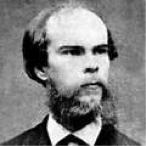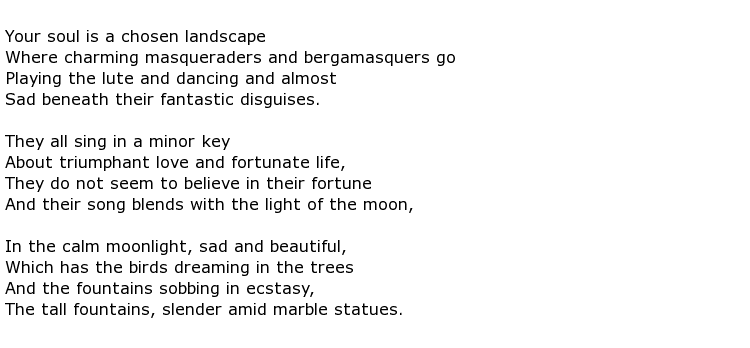 Paul Verlaine was a much loved poet in his native France and even when, in his final years, he had descended into a drink and drug-fuelled pit of despair, the art-loving people of Paris tried hard to lift him out of this self-inflicted trough, supporting him with both financial and welfare assistance. It was too late though and his life was cut short in his early 50s. One (probably) little known fact about Verlaine’s poetry is that the Allies, during the summer of 1944, used some of his verse to pass the message to the French Resistance that the invasion was coming. When the first lines of his poem Chanson d’automne were broadcast, Operation Overlord was to begin in two weeks. A further broadcast of certain lines of this poem meant it was 48 hours away and was, therefore, a signal to start blowing up bridges and railway lines.
Paul Verlaine was a much loved poet in his native France and even when, in his final years, he had descended into a drink and drug-fuelled pit of despair, the art-loving people of Paris tried hard to lift him out of this self-inflicted trough, supporting him with both financial and welfare assistance. It was too late though and his life was cut short in his early 50s. One (probably) little known fact about Verlaine’s poetry is that the Allies, during the summer of 1944, used some of his verse to pass the message to the French Resistance that the invasion was coming. When the first lines of his poem Chanson d’automne were broadcast, Operation Overlord was to begin in two weeks. A further broadcast of certain lines of this poem meant it was 48 hours away and was, therefore, a signal to start blowing up bridges and railway lines.
Paul-Marie Verlaine was born in the northern French town of Metz in March 1844 but his family moved to Paris seven years later. He had a decent education which led to a bachelors’ degree when he was 18 years old. He was already writing poetry but, under the influence of his father, a Captain in the French Army, he joined the French Civil Service. He spent a great deal of time though in the ale houses of the Rue Soufflot with fellow poets such as Leconte de Lisle, Louis Xavier de Ricard and several others. Verlaine’s father despaired of his son’s behaviour and refused to support him financially when Paul declared that he wanted to be a full time poet. Verlaine’s first collection, called Poèmes saturniens, was published in 1866.
Four years later began a tempestuous period in his life when he got married and fathered a son with Mathilde Mauté de Fleurville. He even wrote a poem in her honour – La bonne chanson. However he abandoned her as he embarked on a curious, passionate affair with a younger man by the name of Arthur Rimbaud and they lived in London for a while. This ended in near tragedy. Verlaine was in a drunken state when he shot at his lover but only managed to injure him. He was sent to prison though for 18 months and spent his time there studying great writers like Shakespeare and Cervantes. During his incarceration he wrote one of his most famous works – Romance sans paroles.
He converted to Catholicism but the drinking continued. He tried living in England once more, holding down teaching jobs in different parts of the country and another homosexual started with a pupil. It was cut short when the student caught typhus and died in 1883. Verlaine grieved about this loss for some time and five years later published a reflective poem called Amour.
His poetry was recognised by composers such as Gabriel Fauré and Claude Debussy. Fauré took the words of the poem Clair De Lune for his composition in 1887 and Debussy had earlier used the words for a piece for piano and voice but it then passed into history as a famous piano tune. Here are the words from the original poem. It’s a romantic tribute to the beauty of moonlight:

During the last years of Verlaine’s life his health deteriorated rapidly. He lived in slums and public hospitals while drinking in cafes whenever he could. The people of Paris rallied round him and he was elected to the curious post of “Prince of Poets” by his artistic friends. He lived only two more years after this though.
Paul Verlaine died in Paris in January 1896, aged 52.

